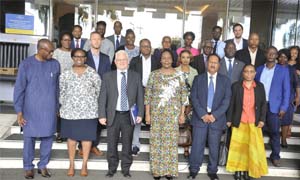TRADE in any country is critical because it promotes economic growth and raises the living standards of the people by enabling the provision of affordable goods and services.
Increased trade for the country results in more jobs for the people thereby increasing revenue for the country and more importantly helps to improve the standards of living.
It is for this reason that the United Nations Development Programme (UNDP) and the Common Market for Eastern and Southern Africa (COMESA) have decided to strengthen partnerships to promoting trade, investment and cross-border cooperation in the region.
UNDP resident representative for Zambia Lionel Laurens says the partnership creates opportunities for businesses and individuals to thrive, unlocking the full potential of the region and creating a more prosperous future for all.
Mr Laurens says through the collaboration, the UNDP and COMESA strive towards building resilient economies that could withstand shocks, promote sustainable development, empower women and youth, and improve the livelihoods of the people in the region.
This includes promoting job creation, developing infrastructure, and promoting sustainable agriculture and natural resource management.
Mr Lauren says one area in which UPND and COMESA could deepen collaboration is on supporting Africa’s borderland communities.
This is in line with the partnership dialogue held by the two organisations themed “Enhancing COMESA-UNDP synergy for Regional integration and promoting socio-economic opportunities in the borderlands of East and Southern Africa”.
Mr Lauren says Africa’s borderlands and their communities are a unique source of ingenuity, places of untapped opportunity and of great resilience.
In Zambia, UNDP proved this when the organisation worked with Informal Cross Border Traders in Livingstone to pilot an innovation.
The innovation was aimed at improving the way informal traders did
their business with their Zimbabwean counterparts.
This was done with the support of the regional UNDP Africa Borderlands Centre last year.
UNDP demonstrated the catalytic power of digitalising the operations of informal traders, using an innovation tool that saw increased access to financial services for small-scale traders, about 70 per cent of whom were women traders.
Mr Lauren says through programmes like COMESA’s Trade for Peace, UNDP and COMESA could unlock the potential of Africa’s borderlands.
COMESA Secretary General Chileshe Kapwepwe says regional integration is central to the successful realisation of the organization’s aspirations for sustainable and inclusive growth and development.
Ms Kapwepwe says COMESA has undertaken a multi-dimensional integration approach that focuses on trade integration, leading the process of trade liberalisation through tariff reductions and the dismantling of non-tariff barriers.
This, she says, is being done by putting in place various trade facilitation instruments to support regional trade.
Some of the facilitation instruments are the Simplified Trade Regime (STR), Rules of Origin, Yellow Card Scheme, Regional Customs Transit Guarantee (GCTG), One Stop Border Post among others.
She further says COMESA is also implementing the Small-
Scale Cross Border Trade Initiative Programme with financial support from the European Union which aims to increase the formalisation of informal small-scale cross border trade flows.
This would lead to higher revenue collection by governments at the borders as well as increase security and higher incomes for small cross border traders.
“COMESA with support from other partners implemented the trading for peace initiative. This process has supported a greater drive for strengthening security across borders with countries proactively enhancing information sharing and discussing options for joint initiatives to eradicate threats through engagements such as the Cross-border Committees initiated by COMESA,” she says.
Ms Kapwepwe is of the view that the cooperation between UNDP could help drive regional integration, border economy and trade, and other areas such as human rights.
She says by using trade as a tool to facilitate cross-border trade and improve post-conflict communities’ livelihoods, various efforts have been made to enhance border communities’ socio-economic conditions through the promotion of human rights, justice and reconciliation.
UNDP as a global development organisation strives to eradicate poverty, reduce inequalities, and build resilience for the world’s most vulnerable people.
COMESA on the other hand is a regional economic bloc that promotes economic integration and development in 21 African countries, where UNDP operates.
The partnership aims to ensure strengthened collaborations in achieving the United Nation’s 2030 agenda and the African Union’s 2063 agenda.
The goal of the African Union 2063 agenda is to promote Africa’s growth and economic development by championing citizen inclusion and increased cooperation and integration of African states.
The United Nation 203O agenda aims at attaining sustainable development.








